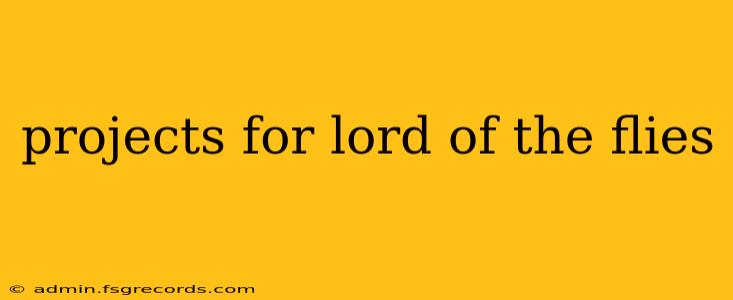Lord of the Flies, William Golding's chilling novel, offers a wealth of opportunities for exploration beyond simple reading. These projects delve into the novel's complex themes, encouraging critical thinking and creative expression. Whether you're a student looking for project ideas or a teacher seeking engaging activities, this guide provides a range of options suitable for different learning styles and skill levels.
Exploring Key Themes Through Diverse Projects
Lord of the Flies' enduring power stems from its exploration of profound themes. These projects encourage students to grapple with these complexities:
1. Civilization vs. Savagery: A Comparative Analysis
- Project Focus: This project examines the gradual descent into savagery, contrasting the boys' initial attempts at establishing a civilized society with their ultimate descent into primal behavior.
- Activity Ideas:
- Debate: Organize a formal debate exploring whether inherent savagery or external factors are more responsible for the boys' transformation.
- Comparative Essay: Compare and contrast Piggy's rationalism with Jack's primal instincts, analyzing their impact on the group's trajectory.
- Visual Representation: Create a storyboard or graphic novel illustrating the shift from civilization to savagery, highlighting key turning points.
2. The Nature of Leadership: A Character Study
- Project Focus: Analyze the different leadership styles exhibited by Ralph, Jack, and Piggy. Explore the strengths and weaknesses of each, and their impact on the boys' survival and moral development.
- Activity Ideas:
- Character Analysis Essay: Conduct in-depth character analyses of Ralph, Jack, and Piggy, focusing on their leadership qualities, motivations, and ultimate fates.
- Role-Playing Activity: Assign students roles and have them act out key scenes, exploring different leadership approaches and their consequences.
- Leadership Portfolio: Create a portfolio for each character, compiling evidence of their leadership style from the text (quotes, actions, interactions).
3. Symbolism and Allegory: Unmasking Hidden Meanings
- Project Focus: Lord of the Flies is rich in symbolism. This project focuses on unpacking the deeper meaning behind key symbols, such as the conch, the fire, the Lord of the Flies itself, and the island itself.
- Activity Ideas:
- Symbolism Essay: Choose three key symbols from the novel and analyze their significance within the context of the story's themes.
- Symbolic Artwork: Create artwork inspired by a chosen symbol, using visual representation to convey its meaning within the context of the novel.
- Creative Writing Piece: Write a short story or poem exploring the symbolism of a specific object or character from the novel.
4. The Island as a Microcosm: A Societal Reflection
- Project Focus: Consider the island as a microcosm of society, reflecting broader societal issues and human nature.
- Activity Ideas:
- Comparative Analysis: Compare and contrast the societal structures and power dynamics on the island with those in real-world societies.
- Research Project: Research historical events or social phenomena that parallel the themes and events depicted in Lord of the Flies.
- Presentation: Create a presentation connecting the themes of the novel to current social or political issues.
Creative and Engaging Project Ideas
Beyond traditional essays and analyses, these projects encourage creativity and deeper engagement:
- Film Adaptation: Create a short film adaptation of a key scene from the novel.
- Radio Play: Adapt a section of the novel into a radio play, focusing on sound and dialogue.
- Modern Adaptation: Rewrite a section of the novel, setting it in a contemporary context.
- Museum Exhibit: Design a museum exhibit showcasing artifacts and information related to the novel's themes.
These projects offer a diverse range of options to engage students with Lord of the Flies on multiple levels, fostering critical thinking, creativity, and a deeper understanding of its enduring themes. Remember to adapt the project to suit the specific learning objectives and abilities of your students.

